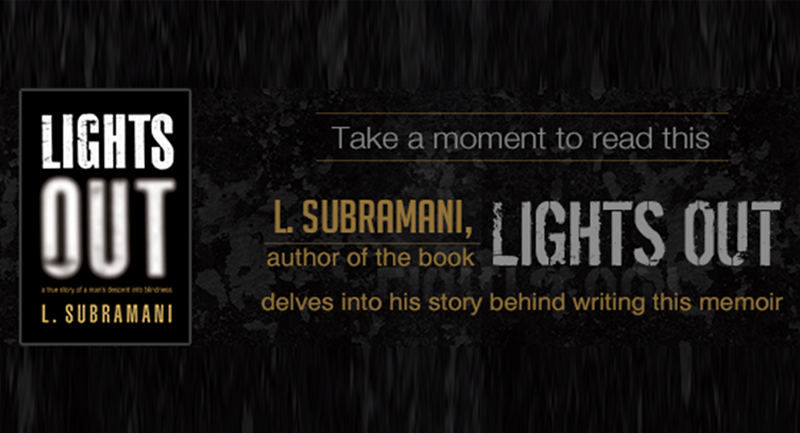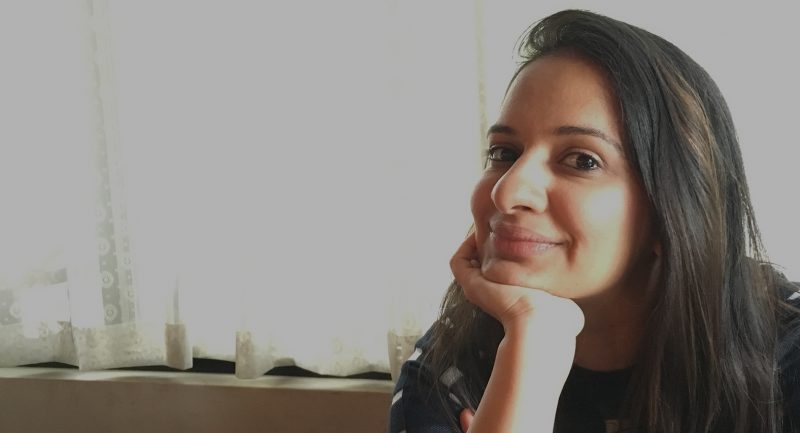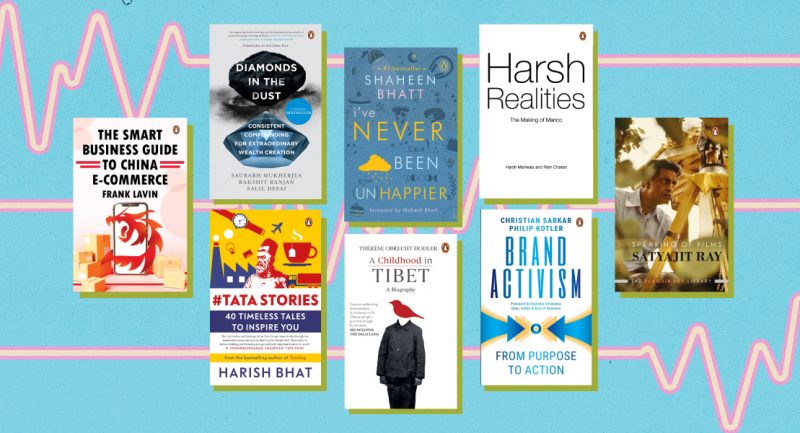

How does it feel when a seemingly normal world around you was to go dark inch by inch? What would happen if someone who has not yet jumped out of his teens were to comprehend blindness that is closing in on him? How would you feel if suddenly you can’t walk normally or detect a stone or an open manhole in the middle of the street?
My book, “Lights Out”, published by Random House India which hit the book stores on Jan 10, deals with this rather difficult and challenging subject of my descent into blindness. Personally, the time of my life when I literally felt the world around me slip into darkness, was precious. Those are the only memories which represent vision or anything to do with seeing. If you tell me the colour of your shirt, I would go back in time and pull out the colour saved in my memory. If you describe the facial expression of a person, I would have to do the same: go back and think if what you describe resembles someone in my past. As a journalist, I try describing everything around me (obviously getting that described beforehand by someone who could see), and I am able to bring a touch of reality to it only because I was not blind years ago. In short, it is like the light at the entrance of a deep tunnel. Even though I am inside the darkness of the tunnel the beacon of light reminds me of a different world, a different time, and a different environment where I felt equal, respected and valued.
That might not sound right to you but it is true. Yes, thanks to the social attitude towards blindness, we don’t immediately feel a sense of belonging in most places, especially the ones which reminds us constantly of our inability to see. People regard and treat us differently which I sometimes find hurtful. On the other hand I also pity those who don’t have any experience of being with a blind person. I would like them to understand how strikingly chilling life could turn even for a normal individual. In fact, one need not be blind by birth to experience blindness, especially if he or she is afflicted with a progressive vision loss condition like Retinitis Pigmentosa.
Recollecting each tiny detail of that life was harrowing enough, but I wanted to live through those days because I realised there are thousands of such people in India alone who are silently going through a similar ordeal. I speak to them on the phone as a volunteer and a mentor. The realization that they are as helpless as I was twenty years ago and are incapable of leading a normal life saddens me.
How do I tell the world that these people need and deserve help? The only way I knew was by writing about it. Not an article or a report this time but a book. The book also shows the difficulties faced by the families of persons who lose their eyesight.
As for social attitude, I’m sure all of you know how much a blind person struggles to express his feelings to the normal world around him. In the course of my interaction with a fellow R.P and progressive vision loss patients, I realise many were not as lucky as I am in terms of finding an environment that allows them to lead a good life. So when you read my book, I would like you to think about the several unfortunate souls out there, living a traumatic life. Please spare a moment for such people and help them lead a normal life in whatever way you can.
If my books can elicit such a response from you it would fulfil my purpose of writing this book.
It is my sincere wish that R.P. becomes a subject of public discussion. We have been neglected and left to suffer in isolation for a long time now. The government, which pours thousands of crores of rupees into preventive eye care, does not spare a penny for people afflicted with conditions like RP. Sometimes they don’t even understand what is happening to them without proper medical attention. Without a system to rehabilitate themselves, they are potentially in a situation where they find it hard to make meaningful contribution to the country’s economic growth. Even if they are talented and skilled they will end up feeling useless and unworthy.
We cannot allow this situation to continue. It is time we put an end to the isolation or neglect of such people. I hope my book triggers similar thoughts in the readers.
——————
About the book
Imagine the world around you slowly blinking out, your familiar world disappearing into darkness till you begin to doubt not only the world’s existence but your own as well. In this terrifying blindness can you find the light?
This is L. Subramani’s inspiring story of triumph.
He suffers from Retinis Pigmentosa, a condition causing gradual and incurable blindness, which affects one in three hundred Indians. Lights Out shows with painful clarity the debilitating process of going blind and the agonisingly bewildering effect it had on him. In this unfamiliar and disconcerting situation he battles his disability to strive for normalcy, till he transforms his most crippling weakness into his greatest source of strength.
You could buy the book here: http://bit.ly/1lVtnM1
About the Author
L. Subramani is currently Senior Subeditor with Deccan Herald (The Printers Mysore Ltd) in Bangalore. He was affected with Retinitis Pigmentosa aged 18 and had to experience gradual loss of vision in two years, though the drastic vision reduction happened in a six month period, leaving him totally blind in the end. He is currently involved in setting up a support system for patients having rare disease or who experience progressive or sudden vision loss. He is doing this with the help of fellow RP patients and other social workers. He has pledged a portion of the proceeds of this book to his new initiative.
——————–








